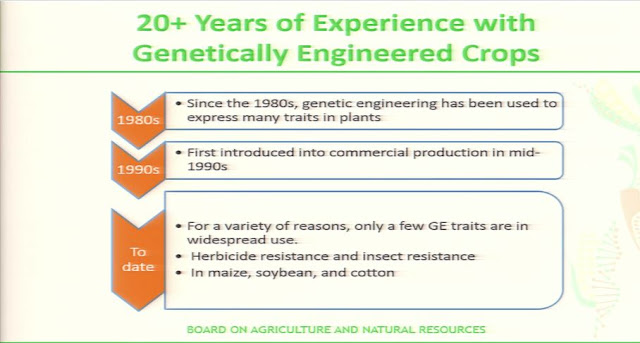The report can be found here: http://www.nap.edu/23395 It is a PDF that you can download for free. You may need to put your email in at one point to get the download, but it is fairly straight forward to get a copy.
The Academy also put out a video that gives a short synopsis of each chapter of the report of which there are 9 chapters. It comes in kinda long, but has a lot of information straight from the report summed up quite nicely.
https://vimeo.com/167020587
Here are just a few shots of the key points from the video. Of course much more detailed information is in the report if any of these points below interest you.
Background information and reason for the study:
More evidence on GMOs is always welcome especially one that is as comprehensive as this one. As the authors point out there still exists a very confusing landscape for the public on the GMO issue. Even in the US states are having different opinions on GMO labeling emphasizing the lack of clarity on this topic.
The Study
This study was one of the most comprehensive studies I have seen. No only did they look at a LOT of previous studies, but they also reached out and went through comments from the public.
Differences in crop-improvement approaches:
One of the more interesting aspects of the study is that is getting harder and harder to determine the differences in our crops between GM and conventional breeding. Both methods are changing the plant's genome in ways that is becoming harder and harder to differentiate. That also means to make generalizations about just GM crops because conventional breeding and GM are so closely interlocked. Due to the blurring lines of these approaches, we need to look at the safety of conventional breeding just as much GM approaches.

Safety:
Of course safety did come up. The study looked at many original studies and agreed with what has been found for years. There is no evidence of adverse health affects. They did put the cavet that we we can never scrutinize every variable and therefore we can never know everything there is to know. However any effects we don't measure, both favorable or non-favorable could come from non-GM food just as much as from GM food.
Environmental effects:
Again the message is no adverse environmental effects of gene flow from GM crops to the wild have been documented. One interesting point from the study is that data from the USDA does not show GM crops have increased the RATE at which US crops yields are increasing. I must admit this was an interesting finding and not one I expected. However if we deep dive into just insect resistance GM crops, they do reduce yield losses from pests, and application of synthetic insecticides has gone down in Bt maize and cotton crops. Further more insect diversity is actually higher in these populations of crops. There are benefits. The downside is insects can develop resistance to GM crops and thus insect resistant management really needs to to followed by the farmers. Don't forget insects can develop resistance to non-GM crops too. In regards to herbicide resistance, we also know weeds develop resistance. This is true for both GM and non-GM crops with resistance. From the GM perspective Round-Up is an example where weeds can still grow even after application of the herbicide. Yields can sometimes be better, but the real benefit is the flexibility farmers get from a logistics view on their farms.
These slides are just some highlights. There is lots of data and information in this report including all kinds of supplemental information. It is great to see a study come out like this. Once again there is no evidence of adverse safety concerns. The study also points out that GM crops are not the only answer, but it is a technology we need to embrace just like every other technology that will allow our farmers to grow the food we need to feed the world.









No comments:
Post a Comment